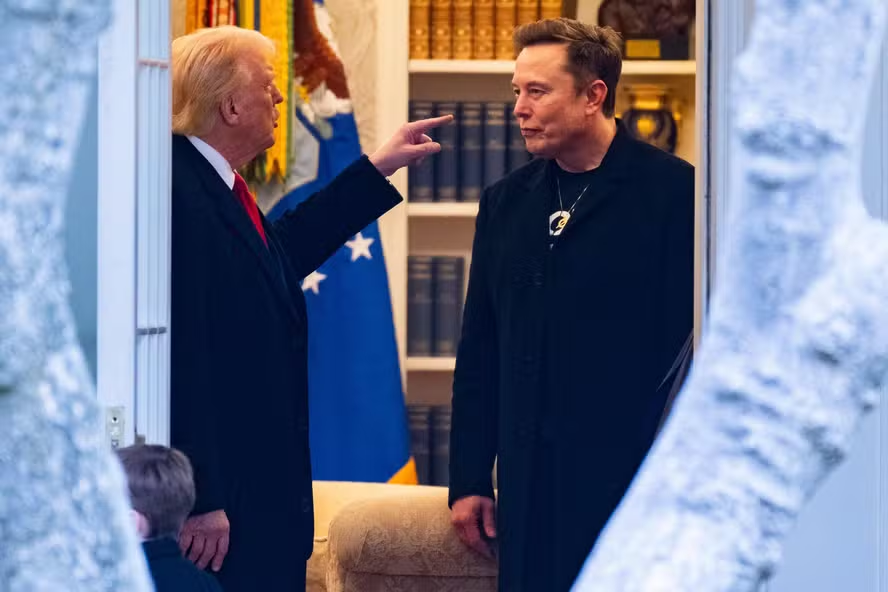Money doesn’t buy friendship, and sometimes it causes disputes between old allies.
Money doesn’t buy friendship, and alliances built around it often prove to be fragile—like a glass ceiling. This is the case in the relationship between Donald J. Trump—current President of the United States—and the multibillionaire owner of companies like Tesla and SpaceX, Elon Musk. What once seemed to be a strong and prosperous alliance eventually revealed its cracks.
The relationship between the two billionaires gained significant media attention during the 2024 U.S. presidential campaign. Moreover, the alliance between the two was marked by broken promises and large sums of funding. For example, according to BBC News Brasil, Musk declared his unconditional support for the Republican president and his desire to take office in Washington after the assassination attempt Trump suffered during the election race. Furthermore, according to the same outlet, Musk’s donations to Trump and other Republicans totaled over R$ 1.6 billion. In return, it is clear that the U.S. president gave Musk considerable space in shaping his administration, even granting him institutional powers. Notably, the South African was responsible for the creation of DOGE (Department of Government Efficiency), focused on cost-cutting, and had broad autonomy to select the staff that would compose the agency. Many of the bureaucrats at DOGE were previously affiliated with Musk—via his companies. Additionally, Musk’s companies are also connected to the U.S. government through public funding. According to BBC Verify, SpaceX alone has received more than R$ 116 billion in government contracts since 2008. It is important to note that the U.S. government is linked to Musk’s companies because they play a vital role in the government’s strategic planning. For instance, SpaceX supplies products that support operations led by NASA (National Aeronautics and Space Administration), the U.S. space agency responsible for space research and exploration.
In this regard, it is worth highlighting that until recently, the two maintained a symbiotic relationship of political and financial support. Nonetheless, the relationship came to an end with the release of the budget proposal by the Republican president, titled One Big Beautiful Bill. The initiative triggered a wave of criticism from Musk, who publicly condemned the bill on his social network, X. In response, according to BBC News, Trump retaliated against Musk’s remarks via Truth Social, threatening to cut subsidies received by Musk’s companies using DOGE—the very department Musk created—stating: “The easiest way to save money in our Budget, billions and billions of dollars, is to end Elon Musk’s subsidies and government contracts. I’ve always been surprised Biden didn’t do that!”
As previously mentioned, the contents of the One Big Beautiful Bill were the catalyst for the rift between the two. But what exactly does it propose? First, according to the media outlet Exame, it is a project that envisions large-scale investments and fiscal changes. Trump, who had firmly promised tax cuts and deficit reduction, now faces political opponents who argue that the opposite will occur for the American population following the bill’s approval on 07/01/25. More specifically, the Big Beautiful Bill aims to stimulate economic growth through infrastructure investment, along with fiscal reforms such as tax reductions to promote innovation and U.S. competitiveness. According to Trump, it is through large-scale projects that jobs will be created directly and indirectly, much like the post–World War II boom driven by labor demand. Moreover, there is a proposal to digitize public services to cut operational costs. However, it is crucial to note that high-spending projects combined with tax reductions can indeed increase the public deficit. The project’s success hinges on the speed of results—such as job creation, which would generate new tax revenues—and the efficiency of mechanisms to prevent fiscal mismanagement.
In this sense, it remains unclear how the relationship between the two will evolve, though signs suggest the winds are shifting. Following the Trump-Musk fallout, Musk promoted the idea that bipartisanship (Republicans and Democrats) limits what “true Americans long for.” On his X profile, he stirred up his followers by asking whether the U.S. should have a new party—a third option. Most users voted “yes,” although it’s unclear whether these voters were American citizens. Still, it is important to note that Musk’s next moves are unpredictable, which only adds to the growing perception of inconsistency—especially given that less than a year ago, the billionaire pledged unconditional support to the president.
On the other hand, the U.S. president has also behaved inconsistently by suggesting the possibility of deporting Musk. When asked by a journalist on 07/01/25 whether he would deport his former political ally, Trump replied, “We’ll have to take a look,” according to CNN Brasil. It is uncertain whether deportation is even possible, since Musk is a naturalized American citizen. According to the 14th Amendment of the U.S. Constitution, all citizens are equally protected under the law. However, as a naturalized citizen, it is theoretically possible for his citizenship to be revoked through a rare legal process called “denaturalization,” according to CNN Brasil. This process only applies in cases of intentional fraud, omission of relevant facts during naturalization, or membership in terrorist or Nazi organizations. Therefore, the next steps in this feud remain unpredictable.
Thus, what was once an unshakable relationship between two powerful magnates now appears to be a rupture that could cause instability in the political and strategic landscape—especially considering Musk controls key companies involved in government science agencies like NASA. Additionally, according to The Washington Post, NASA and the Department of Defense contracts with SpaceX represent the majority of the rocket company’s funding. Furthermore, Tesla has received $11.4 billion in regulatory credits from federal and state programs aimed at promoting the electric vehicle industry, and experts claim its sales have been boosted by a $7,500 federal tax credit for electric vehicle consumers.
It becomes clear, therefore, that Musk’s companies have managed to grow over the years with the help of the U.S. government budget. Naturally, the South African’s net worth was also boosted by this trend. For this reason, he may have become a vocal critic of Trump’s budget plan, given that the proposed tax cuts could leave the government with less money to fund his companies through public-private contracts.
References:
https://www.bbc.com/portuguese/articles/c74qygxvg20o
https://www.cnnbrasil.com.br/internacional/elon-musk-pode-ser-deportado-por-trump



